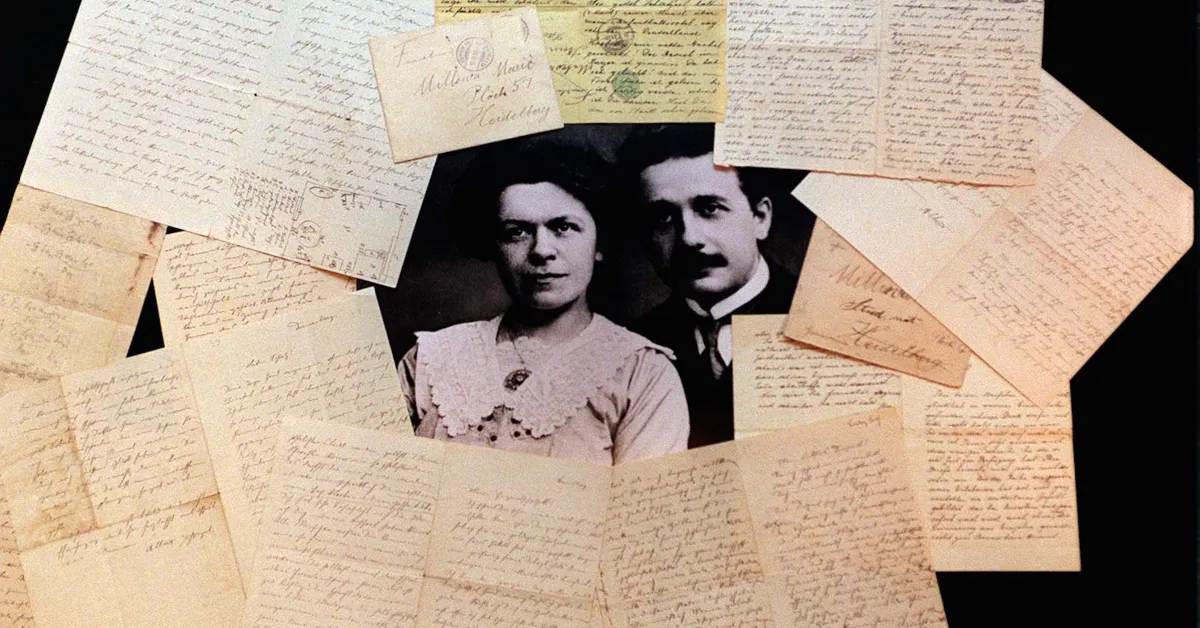Mileva Maric, the genius of a woman who was eclipsed by her husband's glitter, Albert Einstein

By Albert Vataj
The woman has found it very difficult, even impossible to impose on the world even with genius. Of this bad luck was Mileva Maric, Albert Einstein's first wife. The only one who could probably take the deserved place, but not to be thrown into forgetfulness. Although dismissed and not considered due to patriarchal rule both in science and knowledge, she has managed to have an undeniable place in her husband's scientific achievements. All the alleged and proven evidence shows that it contributed substantially to the theories of the great physicist, though skeptics and maliciously tried to avoid her deserved place.
She was a talented mathematician and physicist, why not in the bounds of genius. The two met at the Polytechnic Institute of Zurich. And unlike Einstein, she had to fight and obtain special permits to participate.
At the university, she received higher grades than Einstein. In the applied physics, she received the highest grade 5. Einstein received a grade 1, minimal rating. On December 13, 1900, they presented the first article on capillary, but it was signed only by the name of Einstein, as their works would not be published in the name of a woman on them.
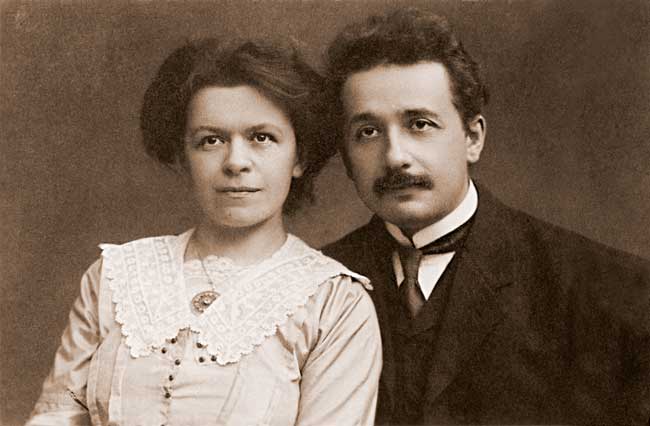
Mileva Marić and Albert Einstein met in 1896, when the two enrolled in the VIA course for target teachers of mathematics and physics in high schools. From the letters they exchanged from late 1897 to 1898, it is clear that they soon developed a close relationship. In the photo, the Maric-Ajntein couple in 1912.
Many of his lecture notes are with the manuscript of Mileva Maric and Albert was heard once in a party saying: “I need my wife; It helps solve all my mathematical problems. ” And it was a truth that no one but Einstein, the one who dared to say, would not believe it. The facts show that 80% of Einstein's famous works were published during this marriage, referred to as « His Magic Years ». Those magical years ended suddenly after divorced because of its betrayal and abandonment.
As the years go by and the glare of the great physicist does not have its power, it is widely believed that Einstein's first wife, Mileva Maric, made a significant contribution to his scientific work. Numerous publications since 1990 have claimed in various ways that she was co -author of his famous works of 1905, math the letter of special relativity, or even continued to collaborate with her until the birth of the couple's second son in 1910. In this article the author quotes the closest claims that they do not. Quotes are given for more detailed refutation of these claims. It is concluded that there is no good evidence that Mileva Maric was Einstein's secret collaborator.
However, the great truth dares to say Marie Benedict, in the book « Einstein's wife: The true story of Mileva Einstein-Maric », whose pages shed light on the role she had in the life of the great physicist.
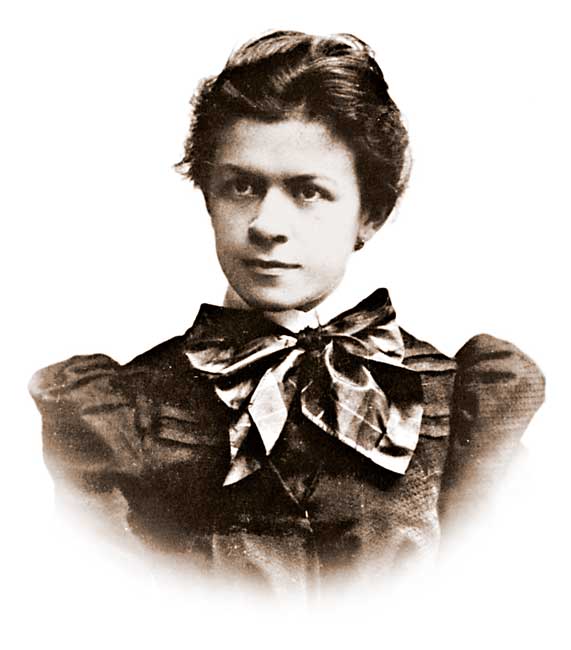
Biographical stories show that Mileva Marić excelled in most subjects during the first years of her education. Marić moved to Zurich in 1894 where he could prepare for a university education because women in Serbia were not allowed to attend university. In the image, Mileva Marić in a portrait of 1896.
Bernisches History Museum / Public Domain
“Albert Einstein's first wife, Mileva Einstein-Maria, remained in limbo for decades. When in 1986 a series of letters exchanged between them were discovered since their studies, her story began to come to light. Some of those who recounted the « Mileva History » made startling assertions: that she was a brilliant mathematician who exceeded her husband and that she had made unattrated contributions to some of his most famous work of 1905, including her special relativity, writes Washington Post
“This book, based on broad historical research, reveals the true history of Mileva.
She was one of the rare women of her time who pursued her studies in science; She and Einstein were students together at the Polytechnic of Zurich. However, Mileva's ambitions for a scientific career suffered some strokes, failure in the diploma exams, a conflict with the doctoral dissertation leader, as well as a pregnancy out of marriage to Einstein. They were married in 1903 and had two sons, but their marriage failed.
Was the unauthorized co -author of her husband, an unpaid assistant or his indispensable assistant? It is tempting to believe that she was Einstein's secret collaborator, but the authors and wife of Einstein examine the concrete evidence, and a chapter from my Ruth Lewin offers an important historical context. «
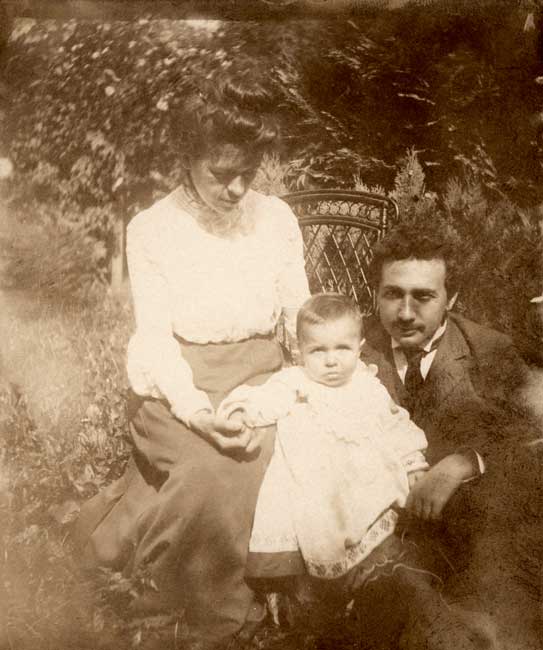
Mileva Marić and Albert Einstein with their son Hans Albert, in a portrait realized between 1904 and 1905. The couple were married in 1903. What we know is that Mileva Marić played a pioneer role at a time when women had little opportunity to get training in physics and mathematics.
ETH Bibliothek Zurich, Bildarchiv / HS_1457-72 / CC by-SA
The story they tell is that of a bold and determined young woman who fought against numerous obstacles at a time when science was not welcoming to women. Given the barriers that women in science continue to encounter today, (Mileva's history) remains important. «
« After all, the authors end, buying myths for Mileva Einstein-Maric, does further injustice by denying a unique place in scientific history … Her story is' very human history, the true young woman's wrong but bold and determined, which, for various reasons, was unable to fulfill her dreams. Given the barriers that women still face in science, her story remains important. «
« What has become very clear, however, is how it was like to live in the shadow of Albert Einstein. Careful and complete research that encompasses everything, from the couple's early school data to the letters written between the two, reveals what Marić really did and puts it in the context of the Women's War to enter the world of science in the end of the twentieth century. The book reveals that success is not based on gender, but on the opportunity, encouragement and education, and that denying such things for women is a painful loss of much needed gifts from a troubled world. «
“Throughout history, Albert Einstein's first wife, Mileva Maric, was practically written by the history of the great physicist. She was later regarded as a secret collaborator in his most famous theories. Einstein's researcher and science historian Cassidy aim to put the right record in this convincing biography. They pass over school transcripts, contemporary letters and stories to create a cohesive picture of Maric's life.
She overcame prejudices against women in science to pursue a doctorate in physics – but eventually gave up her career when she married Einstein. As a trustee and his study partner during the university days, Maric undoubtedly contributed to the development of Einstein as a scientist. But the authors find no evidence that it was a co-existent of relativity, as some have claimed. « Tragically, » they write, « she did not reach her full potential as a scientist. . . Nor did she fulfill her hopes and dreams in marriage and in life. » Would conclude, « Scientific American »
« Somewhere under noise and dust is the real person who show Cassidy's testimonies: an intelligent woman who worked hard to get an intellectually demanding education and suffered deep personal blows on the deepest bruising of being the wrong gender at the wrong century. Our century must take care of it. The deck is still accumulated against female scientists. A Mileva Marić raised in the twenty -first century would still face a lack of credit – and would only be one on the long list of obstacles and prejudices. » quoted in « Nature ».
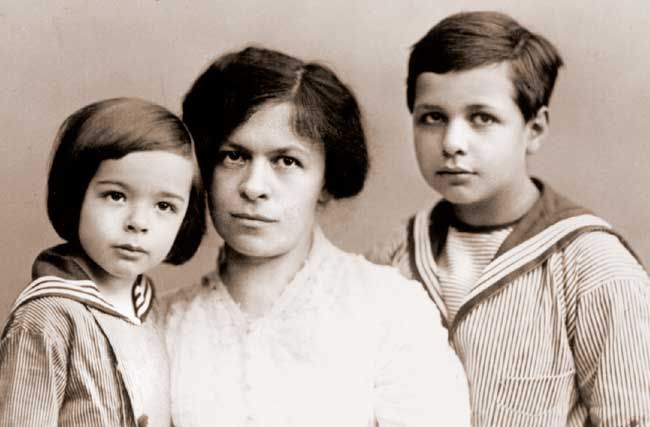
Mileva Marić with the two sons she had with Albert Einstein, Eduard (born 1910) and Hans Albert (born 1904), taken in 1914. Before getting married, in early 1902, the couple had a daughter, but it is unknown whether she died when she was a baby or was given for adoption. When she was pregnant with her daughter, Marić failed for the second time in the final exams for the teaching diploma.
Jerusalem's Hebrew University
« Financial Times » would define that « what appears instead is a portrait of a young but frustrated young woman who tragically failed her full potential as a scientist … This biography of the first forgotten woman of Einstein instead offers Albert's terrible accusation: not there; A visionary who saw the light of the stars in the universe, but not the dark closer to the house. ”
« An impressive, compassionate achievement. »
“Einstein's wife rebuilds Maric's early life, fairly and accurately. Compact volume will be an informative addition to library collections and a fascinating account for inquisitive readers. «
For « Perspective Physics », « Einstein's wife finally offers an authoritarian description of Mileva Einstein-Maric in history. It is also a case study of a laborious research on the background of a long history of mythology. And finally, he answers the annoying question of why such a broad and troublesome historical search is really needed.


